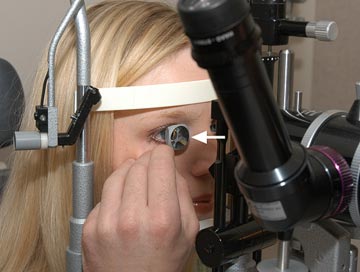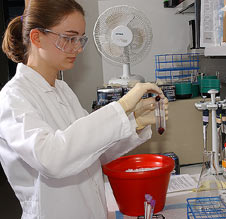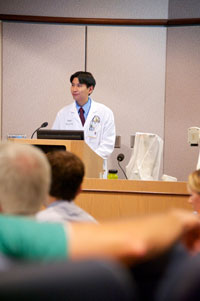About the Program
![]() The glaucoma fellowship is a one-year program beginning on July 1 of each year. We emphasize both clinical and research training in this fellowship. An additional year of basic research fellowship may be arranged. Our glaucoma fellowship is AUPO FCC approved.
The glaucoma fellowship is a one-year program beginning on July 1 of each year. We emphasize both clinical and research training in this fellowship. An additional year of basic research fellowship may be arranged. Our glaucoma fellowship is AUPO FCC approved.
The University of Iowa Glaucoma Center has a passion for eradicating needless blindness due to glaucoma. The war on glaucoma blindness takes place on three fronts: clinical care, teaching, and research. The University of Iowa is at the forefront in all three of these arenas:
- Providing the highest quality patient care with the latest technology
- Educating clinicians, researchers, students, and patients
- Researching the causes of glaucoma and developing tools to aid in diagnosis and treatment
The clinical experience provides extensive training in the diagnosis and treatment of glaucoma. We are the major glaucoma referral center for Iowa and western Illinois, an area with a patient population of about three million. Most of our patients have fairly advanced glaucoma and will provide the opportunity for the fellow to acquire skills in gonioscopy, disc evaluation, and visual field interpretation. The laser and surgical experience is comprehensive and includes trabeculectomy; glaucoma drainage devices (Baerveldt and Ahmed implants); minimally invasive glaucoma surgeries (GATT, KDB, ABiC, iStent), and infantile glaucoma surgery.
 Patient Care
Patient Care
Our fellowship training combines clinical and surgical experience. As the largest tertiary care center in Iowa, we receive referrals from across Iowa and the surrounding states. Fellows study directly with leading experts and experience a wide spectrum of cases, from the very simple to the most complex.
Education
The Department of Ophthalmology at the University of Iowa has a unique, superlative teaching program. Morning rounds are held Monday through Thursday from 8:00 to 8:45 a.m. These are attended by all faculty, fellows, and residents and consist of patient presentations, seminars, and interesting discussions. Every Friday morning during the academic year, faculty members present a two-hour lecture covering sections of the Basic and Clinical Sciences course subject material. Additionally, the Glaucoma Service has chart rounds at the end of every clinic, where complex cases of the day are discussed.
Faculty are always available to provide guidance, mentorship, and research assistance. However, glaucoma fellows enjoy a balance of supervision and autonomy to work independently.
Our fellows also become very involved in the training of our residents and medical students both on a one-to-one basis in the clinic, as well as in morning rounds.
Research
Each glaucoma fellow will design, execute, and complete a research project. Fellows select a faculty mentor who will provide guidance and assistance with the project. Research is presented at the annual Residents' and Fellows' Day in the Spring. Fellows are encouraged to publish and present their research at regional and national meetings.
There are also many opportunities to participate in ongoing research projects of the glaucoma faculty. Research interests in the Glaucoma Service include the molecular genetics of glaucoma, glaucoma cell biology, pediatric glaucomas, glaucoma education, visual field testing, and ocular imaging.
Research Training
 Each ophthalmology fellow is expected to complete a research project based on clinical or laboratory experience. Research is usually performed within the department, but can take place in another department or, occasionally, at another institution. The research interests of the faculty are varied, and many projects are in progress. Presentations of research are made annually during the Resident/Fellow Research Conference at the end of the academic year. The P.J. Leinfelder Award is given annually by a faculty committee to the fellow who has made the most significant contributions in preparing and delivering their research.
Each ophthalmology fellow is expected to complete a research project based on clinical or laboratory experience. Research is usually performed within the department, but can take place in another department or, occasionally, at another institution. The research interests of the faculty are varied, and many projects are in progress. Presentations of research are made annually during the Resident/Fellow Research Conference at the end of the academic year. The P.J. Leinfelder Award is given annually by a faculty committee to the fellow who has made the most significant contributions in preparing and delivering their research.
- Visit our most recent Resident/Fellow Research Day program for examples of typical areas of research interest.
- About our Lab Facilities
- Faculty Research Interests
- About the Institute for Vision Research
Rounds, Lectures, and Conferences
 Grand rounds are held Monday through Thursday from 8:00 to 8:45 a.m. in the Braley Auditorium. All residents and staff attend unless operating or engaged in acute medical care. During rounds, residents and fellows develop their public speaking skills by making presentations. Discussion by the faculty and house staff follows each case.
Grand rounds are held Monday through Thursday from 8:00 to 8:45 a.m. in the Braley Auditorium. All residents and staff attend unless operating or engaged in acute medical care. During rounds, residents and fellows develop their public speaking skills by making presentations. Discussion by the faculty and house staff follows each case.
The cases and discussions presented by Residents and Fellows at Grand Rounds are often further developed and published as case reports and tutorials on EyeRounds.org.
Afternoons are, in general, reserved for rotation-specific conferences. Some services such as glaucoma, cornea, neuro-ophthalmology, and pediatric ophthalmology have "chart rounds". These conferences focus on interesting patients that presented that day. Discussions center on patient care but also cover other areas such as communication, ethics, and systems based care. Other services such as retina have formal conferences, such as Fluorescein conference on Monday afternoons, and Dr. Ed Stone's molecular ophthalmology rounds on Tuesday nights.
Once a week during the academic year, didactic lectures on ophthalmology are presented. These two-hour lectures are organized to coincide with the American Academy of Ophthalmology’s Basic and Clinical Sciences Course. Lectures cover most aspects of basic and clinical ophthalmology. Once every 10 weeks these sessions include a journal club covering recent journal articles in that subject area to help develop skills in practice based learning.
Six, day-long clinical conferences are held during the academic year. Clinics are closed on these days. Ophthalmologists from throughout Iowa and Illinois attend and present challenging clinical problems for discussion by faculty and guests. These meetings feature a visiting professor who presents a lecture based on his/ her research interests. The day is balanced by the presentation of a more clinically oriented topic. This conference has contributed to the excellent rapport between practicing ophthalmologists and the ophthalmology staff at the university.
Each year in June, alumni and other members attend a two- to three-day Iowa Eye Association meeting with invited speakers and a focus on a specific subspecialty topic.
Presentations of research are made annually during the Resident/Fellow Research Conference at the end of the academic year.
Quick Fellowship Facts
By the Numbers
Number of glaucoma fellows accepted each year: 1
Length of Fellowship: 1 year
Faculty Members who train Glaucoma fellows: 4
Benefits
Comprehensive medical, dental, hospitalization and pharmacy benefits for residents/fellows and their dependents
Vacation each year: 3 weeks, for specific information Paid Time Off and Leave Information
Board Certification Requirements
Glaucoma is not a Board Certified subspecialty, However, Ophthalmology is Board Certified. Visit the American Board of Ophthalmology for specifics on board certification requirements